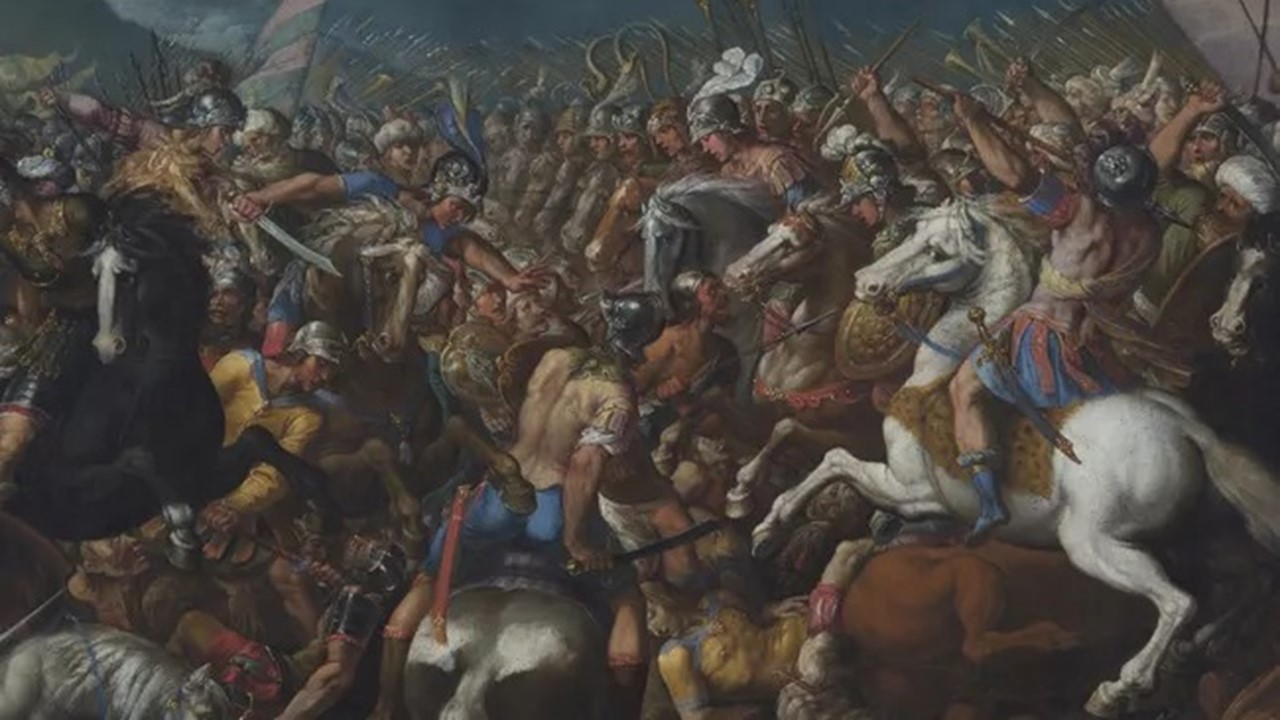An ocean was raging in his soul and in the silence of the night when the howls of dogs sent a woeful presage through the air, Arjuna, the peerless warrior walked towards the playgrounds of Kurukshetra. A passing wind seemed to whisper that the breaking of the dawn will never be same in his life for all his coveted skills in archery and taint-less fame consummated by years of meditative training will be tested against his kith and kin, against his own masters and preceptors and all the arrows that fly from his bow will hunt for the blood of precious lives he ever valued.
 “Fare forward voyager, not fare well”, the thundering voice of Krishna reverberated in his ears spontaneously and the effusive power of his wisdom in the furious debate they had that eventful day overwhelmed Arjuna. He saw a gory vision of a river of blood gushing forth from the west engulfing the serene plain filled with lifeless cadavers whose gaping wounds echoing the most difficult questions of justice and righteousness of life. “Were all my ordeals and penance to become a crafty warrior reserved for this gruesome war to be fought tomorrow when the first rays of Sun arrive to murder my own blood? How can I not fare well without being haunted by the consequences of my actions and just fare forward clutching on my duty to wage war to establish an illusory righteousness? Will I not be held accountable for all the innocents that will be butchered? How cold and unsympathetic are the arguments of Krishna?" Awakening from a trance, he walked back to his tent departing from the wisdom of Krishna and entering into the threshold of his riotous mind…
“Fare forward voyager, not fare well”, the thundering voice of Krishna reverberated in his ears spontaneously and the effusive power of his wisdom in the furious debate they had that eventful day overwhelmed Arjuna. He saw a gory vision of a river of blood gushing forth from the west engulfing the serene plain filled with lifeless cadavers whose gaping wounds echoing the most difficult questions of justice and righteousness of life. “Were all my ordeals and penance to become a crafty warrior reserved for this gruesome war to be fought tomorrow when the first rays of Sun arrive to murder my own blood? How can I not fare well without being haunted by the consequences of my actions and just fare forward clutching on my duty to wage war to establish an illusory righteousness? Will I not be held accountable for all the innocents that will be butchered? How cold and unsympathetic are the arguments of Krishna?" Awakening from a trance, he walked back to his tent departing from the wisdom of Krishna and entering into the threshold of his riotous mind…
Robert Oppeinheimer, widely acclaimed as “father of the atom bomb”, exclaimed in frenzy, echoing the words of Krishna when he saw the mushroom cloud ascend like a theatre of the macabre to the heavens during the first test detonation of the bomb in New Mexico, "Now I am become Death, the destroyer of worlds." Subsequently, the “Little Boy” and “Fat Man” wiped out almost the entire populations of Hiroshima and Nagasaki a few months later. One exceedingly disturbing photograph shows the “shadow” of a man vaporized by thermal rays imprinted on the steps of Sumitomo Bank in Hiroshima. Oppeinheimer, on his deathbed was awakened in his New Jersey home by an apparition who mumbled incoherently, “I am the shadow. All your Summa Cum Laude intellect was used to develop a weapon that can wipe out the species of mankind. You should have fared well voyager and not fared forward.”
 An obliterated Japan emerged from the ashes like a phoenix, faring forward, becoming a highly industrialized nation with a society worthy of emulation although permanents scars of the war and nuclear bomb had left an indelible mark on its soul. History is replete with heroic feats of resilience, individual and group after horrendous crimes and injustice meted out by someone who hasn’t fared well. Hitler massacred 6 million Jews by signing off the euphemistic Final Solution and Night and Fog death sentence dossiers, Pol Pot to herald an Agrarian Utopia unleashed a genocide of his kindred in Cambodia, Stalin purged an entire Russia, China rose to prominence to become a global superpower post Mao’s disastrous Great Leap Forward and Long March and history is strewn with such marvelous pearls of human resilience. Through indomitable human will and perseverance in the unfailing trust in hope and change, all victimized societies invariably fared forward. On the contrary, by juxtaposition, if governments, tyrants and individuals could have fared well in the first place, the world would not have witnessed so many wars and famines and bloodshed and tears. The Holy Bible unequivocally exhorts the cardinal message of faring well at all times in its timeless verses in Galatians 6:9-10, “And let us not grow weary of doing good, for in due season we will reap, if we do not give up. So then, as we have opportunity, let us do good to everyone...” and explicitly warns in the proverb, “Live by the sword, die by the sword”.
An obliterated Japan emerged from the ashes like a phoenix, faring forward, becoming a highly industrialized nation with a society worthy of emulation although permanents scars of the war and nuclear bomb had left an indelible mark on its soul. History is replete with heroic feats of resilience, individual and group after horrendous crimes and injustice meted out by someone who hasn’t fared well. Hitler massacred 6 million Jews by signing off the euphemistic Final Solution and Night and Fog death sentence dossiers, Pol Pot to herald an Agrarian Utopia unleashed a genocide of his kindred in Cambodia, Stalin purged an entire Russia, China rose to prominence to become a global superpower post Mao’s disastrous Great Leap Forward and Long March and history is strewn with such marvelous pearls of human resilience. Through indomitable human will and perseverance in the unfailing trust in hope and change, all victimized societies invariably fared forward. On the contrary, by juxtaposition, if governments, tyrants and individuals could have fared well in the first place, the world would not have witnessed so many wars and famines and bloodshed and tears. The Holy Bible unequivocally exhorts the cardinal message of faring well at all times in its timeless verses in Galatians 6:9-10, “And let us not grow weary of doing good, for in due season we will reap, if we do not give up. So then, as we have opportunity, let us do good to everyone...” and explicitly warns in the proverb, “Live by the sword, die by the sword”.
The mercurial cosmologist, the late Carl Sagan laments on the fall of man, “Every one of us, in the cosmic perspective, precious. If a human disagrees with you, let him live. In a hundred billion galaxies, you will not find another”. Perhaps humans are veritable prisoners to the in-built deterministic pattern of evil manifest in our inner being, pre-wired as concupiscence and pugnacity. Even if he wants to do good, he is helpless and plausibly condemned to commit evil against his wishes as bemoaned by St. Paul in Romans 7:18-19, “I have the desire to do what is good, but I cannot carry it out. For I do not do the good I want to do, but the evil I do not want to do - this I keep on doing”. And to justify his wrongdoings man invent philosophies to suit himself; moral relativism being a powerful one that has vast sympathizers.
 Somewhere in the hinterland of Ukraine, an elderly father has his head buried in his hands, weeping inconsolably at the shattered body of his daughter killed by Russian missiles, somewhere in the heartland of Gaza, a father is burying the headless body of his child killed by an Israeli drone, dozens of civilians are massacred in a routine Boko Haram carnage in Nigeria, Taliban decrees medieval barbarism in Afghanistan, Al-Qaida and Daesh terror outfits re-group to wreak havoc in Sahel region of Burkina Faso and Al- Shabaab terrorists launch indiscriminate attacks on the masses in Somalia. And every time the distraught humanity wished that somebody had fared well in his actions and thoughts. The causal and consequential analysis of the moral position of right and wrong remains an enigma, immortalizing the words of the Sephardic Jewish philosopher, Baruch Spinoza, “No matter how thin you slice it, there will always be two sides”. A soul searching through history of the track record of man vindicates that he is oblivious of the truth that he is and should be most alive in the space between life and death, but ruefully, most are dead while they are alive. Man is the only animal that seeks justification for its life and deeds. In a loveless world, humans betray themselves and Krishna laughs…and a peel of his laughter races against time to touch accents yet unknown and societies yet unborn…
Somewhere in the hinterland of Ukraine, an elderly father has his head buried in his hands, weeping inconsolably at the shattered body of his daughter killed by Russian missiles, somewhere in the heartland of Gaza, a father is burying the headless body of his child killed by an Israeli drone, dozens of civilians are massacred in a routine Boko Haram carnage in Nigeria, Taliban decrees medieval barbarism in Afghanistan, Al-Qaida and Daesh terror outfits re-group to wreak havoc in Sahel region of Burkina Faso and Al- Shabaab terrorists launch indiscriminate attacks on the masses in Somalia. And every time the distraught humanity wished that somebody had fared well in his actions and thoughts. The causal and consequential analysis of the moral position of right and wrong remains an enigma, immortalizing the words of the Sephardic Jewish philosopher, Baruch Spinoza, “No matter how thin you slice it, there will always be two sides”. A soul searching through history of the track record of man vindicates that he is oblivious of the truth that he is and should be most alive in the space between life and death, but ruefully, most are dead while they are alive. Man is the only animal that seeks justification for its life and deeds. In a loveless world, humans betray themselves and Krishna laughs…and a peel of his laughter races against time to touch accents yet unknown and societies yet unborn…